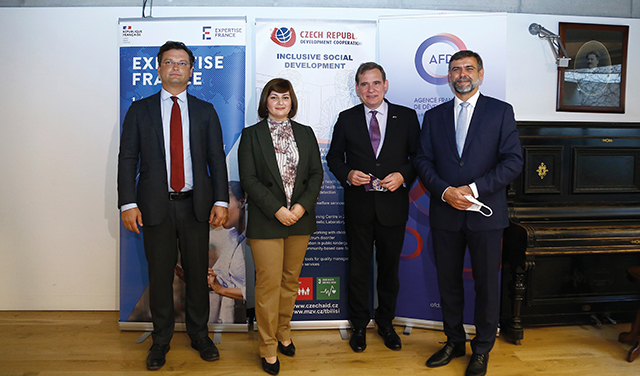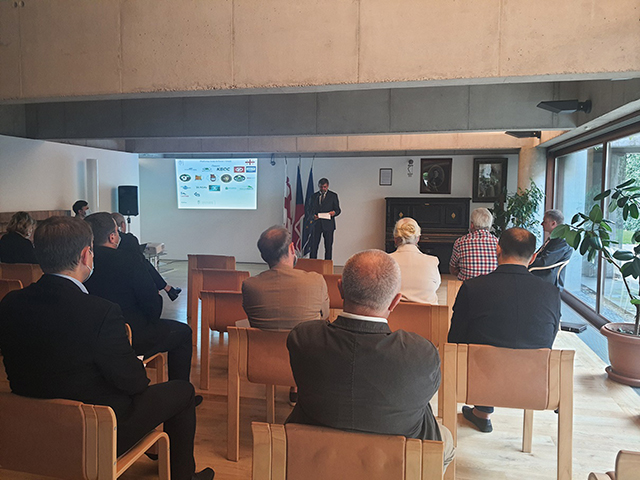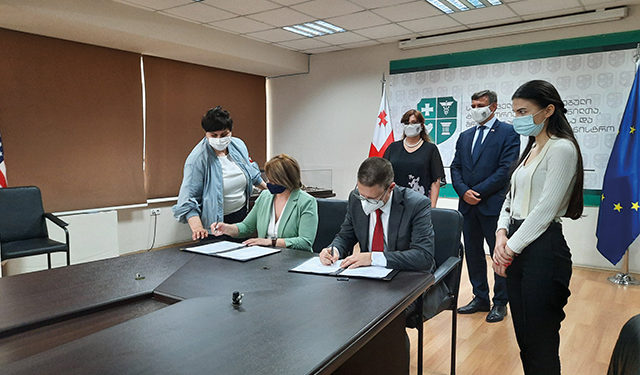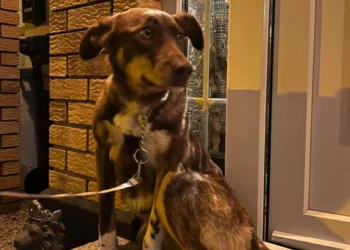The Czech Embassy in Tbilisi kept on with its active engagement throughout 2021, despite the circumstances related to the pandemic, seeing them successfully completing several of their large-scale projects. Among these, the Czech Republic established a completely new cancer screening center in Zugdidi, assisted in the introduction of palliative care for children at Tbilisi State Medical University, and helped to improve services provided to children with autism. They also achieved a remarkable success in the rural development sector, fully equipping and providing technical expertise to the newly opened multifunctional regional Bagebi Beekeeping Center in Tbilisi, ensuring that the excellent Georgian honey will have a better chance on the EU markets.
GEORGIA TODAY sat down with Jana Zelingerová, Head of the Development Cooperation of the Czech Embassy, to find out more about these and other tangible achievements carried out for the benefit of people in Georgia.
“I am very proud to say that with our annual budget of around three million Euros, which can look modest compared to other big donors, the outcomes of the Czech development cooperation are really visible, sustainable and address directly the needs, especially those of the most vulnerable groups of people,” Zelingerová notes.
Georgia is implementing European standards. What assistance can it count on when it comes to sharing Czech experience and know-how?
Fulfilling EU standards is a pre-condition for all candidates wishing to join the EU family. It requires lots of political will for necessary reforms, technical expertise, and the right budget. The Czech Republic has been largely, and for years now, supporting Georgia: for instance, in introducing a standardized phytosanitary surveillance system or sound management of chemicals. Soon, the Czech Development Agency (CDA), together with the FAO, will implement an EU-funded project on food safety that is also focusing on the introduction of EU standards in this field. While substantial and solid foundations in terms of legislation and technical knowledge are being provided through these projects, implementation of the outcomes and their transfer into a better quality of life for Georgian citizens is fully in the hands of the local authorities.
Our bilateral program 2018-2023 has three priority sectors: Inclusive social development, Agriculture and Rural Development, and Good Governance. This is a result of dialogue between different stakeholders on both sides, including public and private sector and civil society. Definition of priority sectors is then based on the appropriate combination of development needs of Georgia, and the areas where the Czech Republic can offer its technical expertise, experience, know-how and Czech innovative solutions. It also reflects a natural continuation of well-established cooperation in some fields and thus enhances the sustainability of our previous achievements.

I would also like to point out that the Czech cooperation in Georgia offers a great variety of tools and instruments that go beyond these three priority sectors. Apart from being one of six priority partner development countries for the Czech Republic, Georgia also benefits from being among priority partner countries for transformation cooperation. Through this transition program, we support civic society and independent media in their endeavor to strengthen democratic values and respect of human rights in general.
You have some programs for supporting SMEs. What are the main challenges they are facing?
A strong private sector and particularly SMEs are, in my perspective, among the key engines of development of any country. Therefore, the Czech cooperation program involves instruments for the support of the local economic sector, for instance our B2B program or Challenge Fund, in partnership with the UNDP, that brings Czech innovative solutions to the country. One of the success stories within the Challenge Fund program, supporting SMEs, is for instance establishment of a local innovation ecosystem around Rustavi’s Business Incubator. Small businesses and start-up initiatives, especially in rural areas, can also reach out for financial support from Czech funds by participating in the grants scheme provided by Local Action Groups. I think there is a huge potential for increasing cooperation between the two countries in the private sector and particularly SMEs.
The Czech Republic is about to start implementing EU-funded projects in social codes and food safety. The CDA opened its office in Georgia to manage these projects. What will be CDA’s scope beyond those?
We are very happy that the Czech Development Agency office was opened on the premises of the Czech Embassy recently, in order to better implement EU-funded projects in the following years. We believe that we can achieve the expected achievements only with the constant presence of a Czech project management team in Georgia. Thanks to the trust the CDA was given by the EU for the implementation of its funds, for the first time in Georgia, the Agency will certainly confirm its strong position of a reliable partner in this country.
I believe that the portfolio covered directly by the CDA office in Tbilisi could be expanded to bilateral projects as well in future.

What projects should Georgia expect from the Czechs in 2022?
We will continue the implementation of ongoing projects, such as, for example, our complex five-year program on sustainable development of the Aragvi Protected Landscape, jointly funded by the Czech and Austrian Development Agencies. The goal of this comprehensive regional approach is to support the beautiful area of Aragvi to reveal its tremendous development and touristic potential and have that used wisely in the future. The best Czech experts in the field of sustainable management of protected areas and sustainable forestry will keep on working together with local partners to make the recently established Aragvi Protected Landscape a living, eco-friendly and sustainable region, respecting its culture and history, and offering decent socio-economic conditions for local inhabitants and good services for visitors. The active engagement of local people in this process is one of the key conditions for success, and so we fully support the recently created Local Action Group Aragvi that, through its participatory approach and grants, enhances employment and local community empowerment in general. The same support of integrated and sustainable engagement of the private, public and NGO sector will continue through the project supporting the Local Action Group in Tskaltubo.
We are coming to a successful closing-up of several broad-scale projects in the sector of social inclusion. However, and I am happy to confirm, the Czech Republic will remain one of the key and most reliable international partners in the social and health sector in Georgia in the upcoming years as well. We will continue our support improving primary healthcare services by introducing a very advanced electronic management system, one which is still not present in some EU countries, and we will go on providing specialized training of doctors in the field of oncological diseases, as well as equipment delivery to partner hospitals.
Together with the Ministry of Internally Displaced Persons from the Occupied Territories, Labor, Health and Social Affairs of Georgia, and the State Care Agency, the Czech Republic will continue its technical and financial support in the process of deinstitutionalization in Georgia. This is a process of closing up big institutional facilities for people with disabilities and creating alternative social services that will provide decent and better quality living conditions for this vulnerable group of citizens.
Alongside these complex large-scale projects, the Czech Republic will continue supporting independent media and civic activism in the country, offer small-scale grants, programs in support of private partnerships, cooperation between universities, and scholarships for master and doctoral programs at Czech universities.
So, our list of activities planned for 2022 is very long, and I am truly looking forward to cooperating with local partners, since, behind every achievement, there is hard team work based on mutual trust and partnership.
I wish and hope that our joint efforts will bring sustainable and systematic changes for the great people of this beautiful country that has so much potential.
Interview by Vazha Tavberidze














